Fuels are highly flammable.
Fuels are poisonous and hazardous to your health.
If you or other people come into contact with fuel, observe the following:
Electrostatic charge can ignite fuel vapour.
Vehicles with a diesel engine:
While the engine is running, component parts in the exhaust system may overheat without warning.
Vehicles with a petrol engine:
Even small amounts of the wrong fuel could result in damage to the fuel system, the engine and the emission control system.
Fuel of this specification may contain up to 10% ethanol. Your vehicle is suitable for use with E10 fuel.
diesel
regular petrol with an octane number lower than 91 RON
petrol with more than 10% ethanol by volume, e.g. E15, E20, E85, E100
petrol with more than 3% methanol by volume, e.g. M15, M30
petrol with additives containing metal
If you have accidentally refuelled with the wrong fuel:
Vehicles with a diesel engine:
Even small amounts of the wrong fuel could result in damage to the fuel system, the engine and the emission control system.
In countries without sulphur-free diesel fuel, refuel using only low-sulphur diesel fuel with a sulphur content less than 50 ppm.
petrol
marine diesel
heating oil
pure bio-diesel fuel or vegetable oil
paraffin or kerosene
If you accidentally refuel with the wrong fuel:
do not switch the ignition on. Otherwise fuel can enter the engine.
Even small amounts of the wrong fuel could result in damage to the fuel system and the engine. The repair costs are high.
do not switch the ignition on. Otherwise, fuel can enter the fuel system.
Even small amounts of the wrong fuel could result in damage to the fuel system and the engine. The repair costs are high.
The vehicle is unlocked.
Pressure in the fuel tank has been released before refuelling.
Do not get into the vehicle again during the refuelling process. Otherwise, electrostatic charge could build up again.
Observe the notes on operating fluids and fuel.
The recommended octane number for your vehicle can be found on the information label in the fuel filler flap.
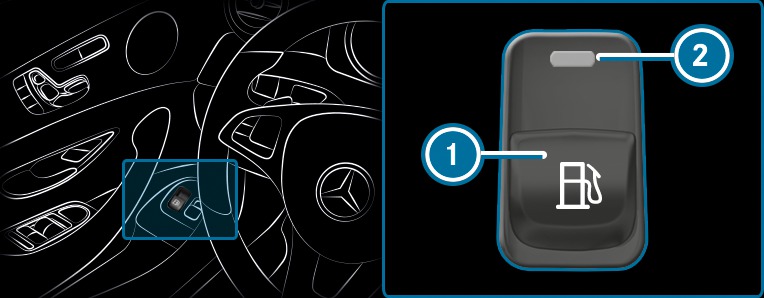
 .
. Indicator lamp  flashes and the Please wait Depressurising tank message appears in the multifunction display.
flashes and the Please wait Depressurising tank message appears in the multifunction display.
If the fuel filler flap is open, indicator lamp  lights up continuously.
lights up continuously.
The Tank is depressurised Ready for refuelling message appears in the multifunction display.
indicator lamp
 flashes initially and then goes out
flashes initially and then goes out the yellow
 engine diagnosis warning lamp lights up
engine diagnosis warning lamp lights up
Opening the fuel filler flap may, in exceptional cases, take up to 15 minutes.
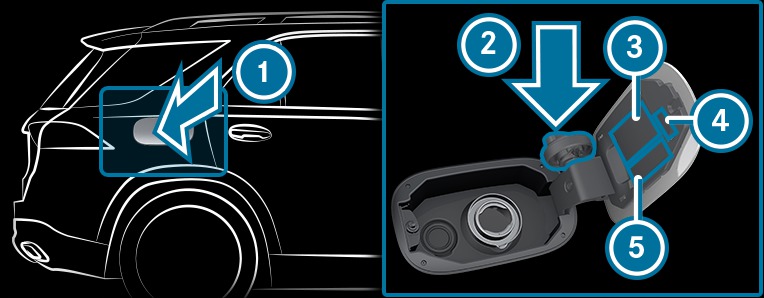





 .
.  .
. Vehicles with a diesel engine: the tank filler neck is designed for refuelling at diesel filling pumps.
Vehicles with a diesel engine: when the fuel tank is completely empty, top up with at least 5 litres of diesel.
Vehicles with a diesel engine: use a filler neck with a large diameter for vehicles with a diesel engine when topping up fuel from a fuel can. Otherwise, the filler neck cannot slide into the tank.
 .
. Close the fuel filler flap before locking the vehicle.
The spelling on the main menu displayed may differ. Therefore, observe the menu overview for the instrument display MoreMore.
Trip distance
Trip computer From start and From reset
ECO display More
If you press and hold the left-hand Touch Control, the values of the function will be reset immediately.
The vehicle is unlocked.
Refill AdBlue See Owner’s ManualThe AdBlue® level has fallen below the reserve range. Top up AdBlue® immediately.
Top up AdBlue Emergency op. in XXX miles See Owner's ManualThe low AdBlue® level will lead to limited performance after the remaining distance displayed has been driven. Top up AdBlue® immediately.
XX,X l Top up AdBlue Emer. op.: max. XXX km/h Start not poss. in XXX km The low AdBlue® level will lead to limited performance from the speed displayed. After the remaining distance displayed has been covered, it will no longer be possible to start the engine. Top up with at least the amount of AdBlue® displayed.
XX,X l Top up AdBlue Switch on ignition, wait 60 sec. or eng. start not poss.The AdBlue® tank is empty. You can no longer start the engine. Top up with at least the amount of AdBlue® displayed. Switch on the ignition and wait for approximately 60 seconds. Start the engine.
You can see the AdBlue® range and level in the Service menu in the multifunction display.
The AdBlue® range shown depends strongly on the driving style and operating conditions. The actual range can therefore deviate from the calculated range.
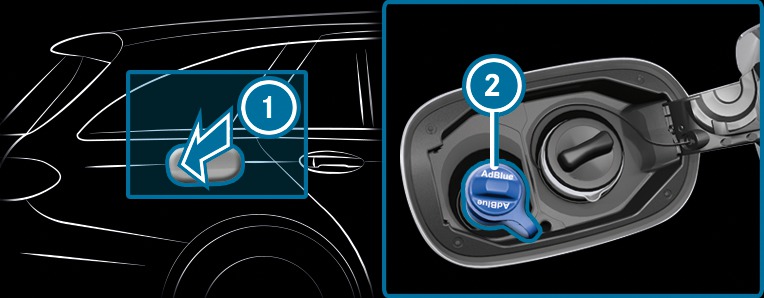
 .
.  anti-clockwise and remove it.
anti-clockwise and remove it. You can also store the AdBlue® filler cap in the fuel filler cap holder in the fuel filler flap hinge arm.
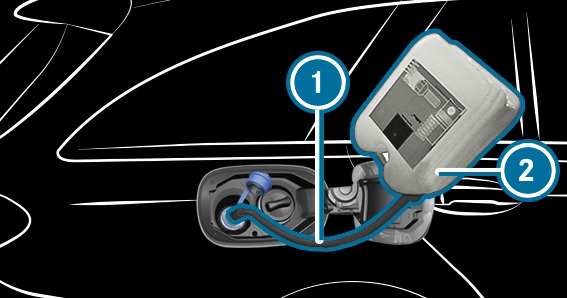
 .
.  onto the opening of AdBlue® refill canister
onto the opening of AdBlue® refill canister  until hand-tight.
until hand-tight.  onto the filler neck of the vehicle until hand-tight.
onto the filler neck of the vehicle until hand-tight.  .
. The filling process stops when the AdBlue® tank is completely full.
AdBlue® refill canister  can be removed when it has been only partially emptied.
can be removed when it has been only partially emptied.
 and AdBlue® refill canister
and AdBlue® refill canister  in reverse order.
in reverse order. If the vehicle could not be started as the AdBlue® tank was empty, it can take up to 60 seconds for the refill to be detected.
Avoid storing AdBlue® refill containers permanently in the vehicle.
If you open the engine bonnet when the engine has overheated or during a fire in the engine compartment, you could come into contact with hot gases or other escaping operating fluids.
Certain component parts in the engine compartment can be very hot, e.g. the engine, the cooler and parts of the exhaust system.
Components in the engine compartment may continue running or start up suddenly, even if the ignition is switched off.
Make sure of the following before performing tasks in the engine compartment:
Windscreen washer concentrate is highly flammable. It could ignite if it comes into contact with hot engine component parts or the exhaust system.
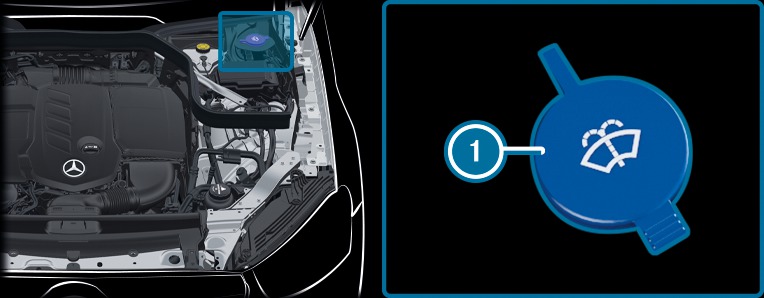
 by the tab.
by the tab. If the windscreen wipers begin to move while you are changing the wiper blades, you can be trapped by the wiper arm.
 button on the combination switch for approximately three seconds More.
button on the combination switch for approximately three seconds More. The wiper arms will move into the replacement position.
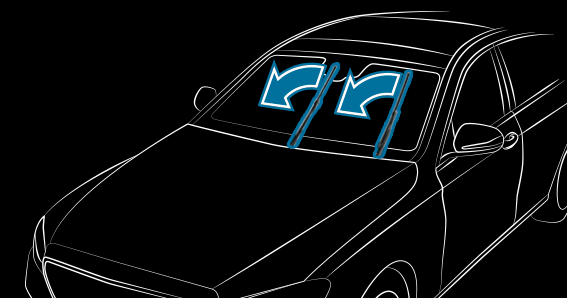
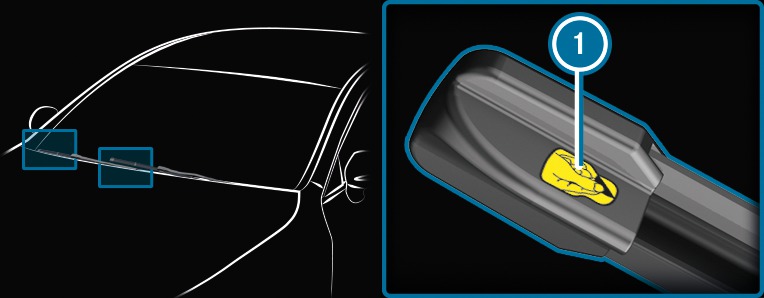
 from the maintenance display on the tip of the newly fitted wiper blades.
from the maintenance display on the tip of the newly fitted wiper blades. When the colour of the maintenance display changes from black to yellow, the wiper blades should be replaced.
The duration until the colour changes varies depending on the usage conditions.
If you open the engine bonnet when the engine has overheated or during a fire in the engine compartment, you could come into contact with hot gases or other escaping operating fluids.
Certain component parts in the engine compartment can be very hot, e.g. the engine, the cooler and parts of the exhaust system.
Components in the engine compartment may continue running or start up suddenly, even if the ignition is switched off.
Make sure of the following before performing tasks in the engine compartment:
The engine has an oil dipstick. If not, the engine oil level can be checked only with the on-board computer More .
Depending on the engine, the oil dipstick may be installed in the engine compartment in different locations.
The waiting time before checking the oil level when the engine is at normal operating temperature is five minutes.

 out and wipe off.
out and wipe off.  into the guide tube to the stop, and pull it out again after approximately three seconds.
into the guide tube to the stop, and pull it out again after approximately three seconds. oil level is correct: oil level is between
 and
and  .
. oil level too low: oil level is at
 or below.
or below. oil level too high: oil level is above
 .
.
the engine has been warmed up.
the vehicle is parked on a level surface.
The engine is running at idle speed.
The engine oil level is determined during driving. Determining the engine oil level can take up to 30 minutes with a normal driving style and even longer with an active driving style.
Engine oil level Measuring now: measurement of the oil level is not yet possible.
Engine oil level OK and the bar display for indicating the oil level on the multifunction display is green and is between "min" and "max": the oil level is correct.
Engine oil level Add 1.0 l and the bar display for indicating the oil level on the multifunction display is orange and is below "min":
Reduce engine oil level and the bar display for indicating the oil level on the multifunction display is orange and is above "max":
For engine oil level turn on ignition
Engine oil level System inoperative: The oil level sensor is defective or not connected.
Engine oil level System currently unavail.
Braking efficiency is reduced after washing the vehicle.
Active Brake Assist
Active Distance Assist DISTRONIC
HOLD function
Active Parking Assist
To avoid damage to the vehicle, deactivate these systems in the following or similar situations:
Active Distance Assist DISTRONIC is deactivated.
The HOLD function is switched off.
the 360° Camera or the reversing camera is switched off.
the side windows and sliding sunroof are completely closed.
the blower for the ventilation/heating is switched off.
the windscreen wiper switch is in position
 .
. the key is at a minimum distance of 3 m away from the vehicle. Otherwise the tailgate could open unintentionally.
in car washes with a conveyor system: neutral
 is engaged.
is engaged.
In car washes with a conveyor system: if you leave the vehicle while it is being washed, make sure the key is located in the vehicle. The park position  is otherwise automatically engaged.
is otherwise automatically engaged.
If, after the car wash, you remove the wax from the windscreen and wiper rubbers, this will prevent smearing and reduce wiper noise.

